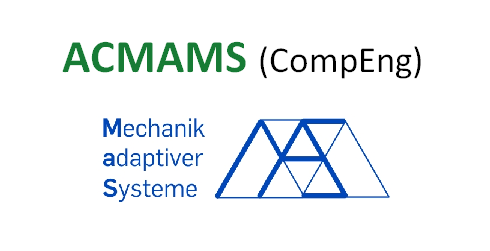
- Teaching format: lectures; exerecises - computer and experimental; face-to-face (see schedule in Moodle)
- First session: on Friday, October 24th, 2025 at 12:15 o'clock, room IC 04/634 CIP-Pool
- The block-course will end in December 2025
- Subscription: Self-enrollment in Moodle opens on Oct. 13th, 2025
(For external students of UNIC partner universities: please send an email to tamara.nestorovic@rub.de)
Learning goals/Competences
Extended knowledge of adaptive mechanical systems, advanced control methods and their application to active control of structures
Content
Advanced methods for control of adaptive mechanical systems are introduced in the course. Introduction involves recapitulation of fundamentals of active structural control and extension to advanced control. In addition to numerical modelling using the finite element approach, the system identification is explained as an experimental approach. Theoretical backgrounds of the experimental structural modal analysis are introduced as well as the terms and definitions used in signal processing. Experimental modal analysis is explained using the Fast Fourier Transform. Advanced closed loop control methods involving optimal discrete-time control, introduction of additional dynamic for the compensation of periodic excitations and basic adaptive control algorithms are explained and pragmatically applied for solving problems of vibration suppression in civil and mechanical engineering.
Extended knowledge of adaptive mechanical systems, advanced control methods and their application to active control of structures
Content
Advanced methods for control of adaptive mechanical systems are introduced in the course. Introduction involves recapitulation of fundamentals of active structural control and extension to advanced control. In addition to numerical modelling using the finite element approach, the system identification is explained as an experimental approach. Theoretical backgrounds of the experimental structural modal analysis are introduced as well as the terms and definitions used in signal processing. Experimental modal analysis is explained using the Fast Fourier Transform. Advanced closed loop control methods involving optimal discrete-time control, introduction of additional dynamic for the compensation of periodic excitations and basic adaptive control algorithms are explained and pragmatically applied for solving problems of vibration suppression in civil and mechanical engineering.
- Kursleiter/in: Daniel Lehmann
- Kursleiter/in: Tamara Nestorovic
- Kursleiter/in: Amit Pal
- Kursleiter/in: Roman Maximilian Trapp
Semester: WiSe 2025/26
